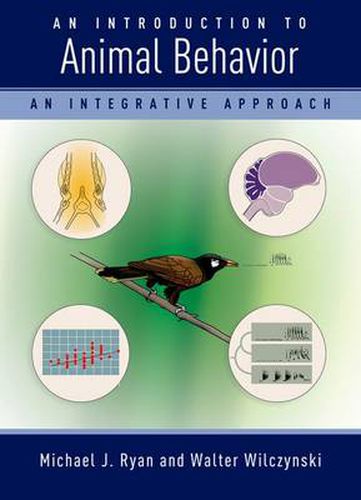Readings Newsletter
Become a Readings Member to make your shopping experience even easier.
Sign in or sign up for free!
You’re not far away from qualifying for FREE standard shipping within Australia
You’ve qualified for FREE standard shipping within Australia
The cart is loading…






The study of animal behavior is one of the most integrative endeavors in biologyit encompasses how the behavior is acquired, how it works, why it has come to work as it does, and how it influences the behaving animal and the animals around it. In Animal Behavior: An Integrative Approach, Michael J. Ryan and Walter Wilczynski address the interrelationship of these aspects of animal behavior, which Nikolaas Tinbergen codified in his four questions as causation, ontogeny, survival value, and evolution. In light of these questions, the authors first review some of the basic concepts of ultimate and proximate aspects of behavior. They make the argument that integrating different levels of analysis is critical for deriving a correct interpretation of behavior. In subsequent chapters, they review topics such as foraging, orientation and migration, sex differences, mate choice, social bonding, cooperation, conflict, and aggression. The authors integrate information from molecular genomics through neuroscience, endocrinology, development, and learning to evolutionary genetics, selection, constraints, and phylogenetics to provide a concise but comprehensive look at current topics in animal behavior. This book provides a well-thought-out and integrated introduction to the complexity of animal behavior that should appeal to advanced undergraduates, graduate students, and professional scientists in other fields in need of a succinct review of the field.
$9.00 standard shipping within Australia
FREE standard shipping within Australia for orders over $100.00
Express & International shipping calculated at checkout
The study of animal behavior is one of the most integrative endeavors in biologyit encompasses how the behavior is acquired, how it works, why it has come to work as it does, and how it influences the behaving animal and the animals around it. In Animal Behavior: An Integrative Approach, Michael J. Ryan and Walter Wilczynski address the interrelationship of these aspects of animal behavior, which Nikolaas Tinbergen codified in his four questions as causation, ontogeny, survival value, and evolution. In light of these questions, the authors first review some of the basic concepts of ultimate and proximate aspects of behavior. They make the argument that integrating different levels of analysis is critical for deriving a correct interpretation of behavior. In subsequent chapters, they review topics such as foraging, orientation and migration, sex differences, mate choice, social bonding, cooperation, conflict, and aggression. The authors integrate information from molecular genomics through neuroscience, endocrinology, development, and learning to evolutionary genetics, selection, constraints, and phylogenetics to provide a concise but comprehensive look at current topics in animal behavior. This book provides a well-thought-out and integrated introduction to the complexity of animal behavior that should appeal to advanced undergraduates, graduate students, and professional scientists in other fields in need of a succinct review of the field.